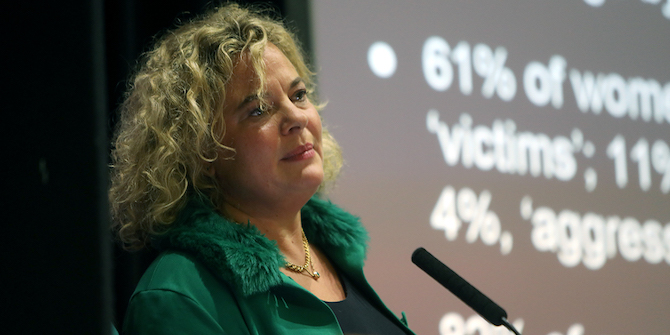 Bookmakers’ odds are becoming an increasingly used source in the coverage of political events – in press, television news and particularly digital press. Yet we rarely discuss how these odds come about. Here, Jamie Loughead outlines the difference between the expertise of the traditional bookmaker and the ‘wisdom of the crowds’ of the newer betting exchanges and provides insights into his work for a well-known British bookmaker.
Bookmakers’ odds are becoming an increasingly used source in the coverage of political events – in press, television news and particularly digital press. Yet we rarely discuss how these odds come about. Here, Jamie Loughead outlines the difference between the expertise of the traditional bookmaker and the ‘wisdom of the crowds’ of the newer betting exchanges and provides insights into his work for a well-known British bookmaker.
8.58am, Tuesday 22nd March. I sit at my desk staring at the horror of the Brussels attacks unfolding before my eyes. I’m as disgusted as any of the millions of people watching around the world, but calmly send an email to my colleagues in the trading room: “all political betting suspended until further notice”. At 9.05am I check the referendum odds on a leading betting exchange and see the odds on Brexit have fallen from 2/1 to 6/4, a 7 percent move in just minutes. The market never sleeps.
The volume at which such odds are used by news outlets seems to have increased massively in the past five years – in line with the growth of online sports gaming. 45 per cent of adults recently surveyed had gambled in the last week – a figure all the more staggering when one remembers that the UK boasts over 9,000 betting shops, 59 race courses, plus other channels such as desktop computer or call centre as a means to get a punt on. This has been helped by the Scottish Independence referendum and upcoming EU referendum (plus the Alternative Vote referendum in 2011). Two clear binary outcomes are bookmaker odds friendly. Straight-forward “Yes/No” or “Remain/Leave” choices are a simple set of odds to communicate into the layman’s terms so craved by journalists or the viewing public.
Ironically, the two general elections in this period of feverish “bookie-quoting” haven’t appeared likely to yield binary outcomes, with many bookmakers predicting complicated coalitions in both 2010 and 2015. Still, the desire for bookmakers’ opinion as a source continued, leaving a number of bookmakers blushing alongside pollsters and pundits on results day in 2015. But we live in an age of 24/7 news and the trend of betting odds in news coverage looks likely to continue. It’s time for an examination of this trend, and for there to be a degree of transparency about how bookmakers arrive at these figures.
Traditional bookmakers vs Betting exchanges
First, a couple of distinctions within “bookies’ odds”. There are two sources for bookmakers’ odds – the first being a traditional bookmaker. A traditional bookmaker can be found on the high street, on the internet, on a racecourse or operation through a call centre. This accounts for the vast majority of bets struck in the UK. The second source is a betting exchange, by far the most prominent being Betfair. On an exchange, a user can both place bets and “lay” bets – but trades against other members of the public. For example, if high street bookmakers are offering 2/1 for a horse to win a race but you don’t think it will win – you can offer 3/1 for it win on Betfair, where your offer can be taken by another user. It allows the exchange user to both be the punter and the bookie.
There is a belief that many in the bookmaking industry prescribe to that “the Betfair price is always right”. This theory is based on the fact that “The Machine” (as it’s known) turns over vast amounts of money, and that the market ultimately finds the right price- betting odds as a representation of perceived probability. As I write the EU referendum betting market on Betfair has traded £3m of bets, and estimates a Remain vote to be approximately a 66.6 per cent shot (at 1/2) against a Leave vote of 33.3 (at 2/1). The market has spoken.
Odds on? (Image: Stef Lewandowski CC BY-NC 2.0)
So why do bookmakers employ people to compile politics odds, when there is such a strongly-established market anyone can monitor? At a number of smaller offshore bookmakers the answer is, they don’t. Such companies just hide behind Betfair’s prices, and add a bit of profit margin either side (in fact the offshore bookmakers really ought to be the second distinction).
But a number of firms do employ specialist politics traders and our role is largely to be ahead of the curve. While the current Betfair price for the referendum is seen as a strong line due to the millions having been traded, Betfair doesn’t trade on many political topics. If you’d like to bet on who the next UKIP leader will be, you can’t do that on the exchanges. If you’d like to bet on the next minister to be shuffled out of the cabinet, again you can’t do that on the exchanges. In fact, outside of the huge political events, Betfair very rarely has a market up, and even rarer is there is enough interest in it for you to have any great faith in the strength of the price. So producing topical daily betting markets that react to the latest news is one area where certain traditional bookmakers undeniably lead the market.
Setting the odds
I can’t speak for counterparts at other bookmakers, but I spend a great deal of time researching my markets. I attend lectures, speak to politicians, network with political journalists, and show sympathy to civil servants as they whinge about their department’s latest policy, never mind the television, press, and Twitter research that any good political nerd will do. And I do this because I know that this gives me the best possible chance of being ahead the curve. Yes, £3m has been traded on Betfair, but the price it has settled at is very much an average of all the bets placed. Thousands of people form that market – some politically much better informed than the average politics trader I’m sure, but a great many aren’t. It’s like the “wisdom of crowds” and a big pig. If you asked a handful of people to guess its weight you could have guesses ranging from 5 stone to 10 stone. Ask 1,000 people and the average guess will probably settle on an answer vaguely close to the pig’s weight. Political traders like myself ought to be like metaphorical pig farmers who could accurately guess the pig’s weight within a few pounds. Well, that’s the theory.
In my opinion it is completely legitimate that for huge political events, journalists refer to exchange price – invariably Betfair’s. They’re a good gauge of how the public assess a referendum or an election will go. We’ve all heard a loudmouth on Twitter proclaim that Brexit is a certainty, or a work colleague claim Brexit is an impossibility – but would either put their house on it? When people back up their opinion with money and ultimately a market is formed, the figures involved are in the public interest, arguably more so than polls. So while Betfair is, of course, a great rival to traditional bookmakers, we must acknowledge its relevance.
Where an exchange is less useful is for comment. The anonymous nature of the way users trade on exchanges, and because there is no odds-compiler/trader overseeing the market means there is no one to interview on the reason behind price moves.
“The Machine” is a reference point to myself, as can be seen on the morning of the Brussels attacks – but I can’t let myself be governed by it. It’s not for me to predict winners as such, it’s for me to predict probability and to foresee impacts ahead of them happening. Whether right or wrong in our analysis, we can see why bookmakers are now seen as a pundit of interest – if not always of great accuracy!
Bookmakers and the media
There’s no shortage of people queueing up to criticise bookmakers. Make no bones about it, we don’t offer politics odds for the goodness of our own hearts – we do it to make profit. So when I offer my referendum odds there is a small profit margin there, as there is with Betfair. But it’s critical my odds are as correct as possible, or my end-of-year figures won’t make for a particularly pleasurable appraisal from my manager. Bookmaker odds are priced to reflect probability as accurately as possible. There’s no agenda behind them, there’s no politics. Unlike some newspapers I’m not expected to lead a customer a certain way or dictate their opinion.
Also, while it is great for a bookmaker to receive press for their odds, it would be foolhardy to frame their odds to attract publicity. Very occasionally I’ll receive a text from a journalist saying “any chance for some odds on Joe Bloggs to stand down as MP this week?” Often I’ll text back saying “33/1”, knowing that while my odds are probably about right, I’ve hardly given the journalist the petrol they wanted to pour on the fire.
Of course I could say “Yes he’s odds on at 1/2 to quit by the weekend!”, but the public would see the cynicism behind such attention-seeking odds. And predictably I would walk into work the next day to discover my company had laid a number of bets on Joe Bloggs to stay on as MP, at the far too generous odds-against. I’m not saying there aren’t bookmakers out there that wouldn’t do such a thing for press, but respected journalists tend to only work with respected bookmakers.
I expect the trend of bookmakers’ odds being used by news media will continue, and over time I suspect the analysis of those odds will improve. I also think the scrutiny of bookmaker’s “predictions” will naturally increase. One only has to look at the pedestal American statistician Nate Silver was placed upon by the world’s media after correctly predicting US presidential elections. Humans have been seeking words of wisdom from fortune-tellers for hundreds of years and maybe bookmakers are now being given such a platform by the media. In that spirit, I’m happy to predict one thing, which I’d make strong odds-on…we’ll make mistakes!
___
 Jamie Loughead is a political odds-compiler for a well-known British bookmaker. His political odds are often used by news media, and he has written about politics as a freelance journalist.
Jamie Loughead is a political odds-compiler for a well-known British bookmaker. His political odds are often used by news media, and he has written about politics as a freelance journalist.








